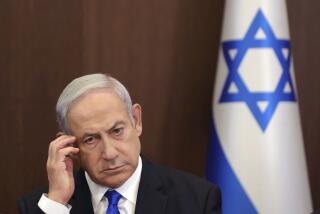Yeltsin’s Illness Agitates Rivals, Stock Market
- Share via
MOSCOW — In a campaign to allay fears that Russian President Boris N. Yeltsin is on his deathbed, government officials and Kremlin doctors struck a not-to-worry pose Thursday as the frail leader of this nuclear-armed power lay in the hospital with pneumonia.
But the moves to temper reaction to the latest warning that the Yeltsin administration may be nearing an end did not calm the business world and the president’s shrill opponents.
After a swell of investor confidence sent Russian stock prices soaring by as much as 30% earlier this week, the markets were aflutter Thursday after word spread that the president’s health woes had once again sidelined him from the Kremlin. The most nervous sectors were those involving foreign business interests, which lost 7% to 10% of their values, the Interfax Financial Information Agency reported.
Perhaps as a counterpoint to the market jitters and mutterings of political rivals, Prime Minister Viktor S. Chernomyrdin decided against abandoning his vacation to take up the reins of leadership dropped by the ailing Yeltsin.
Chernomyrdin called Yeltsin at the Central Clinical Hospital and discussed matters of national concern for about 15 minutes, the Kremlin reported in a news statement, noting that the second in command opted to remain in the country, outside Moscow.
Yeltsin was examined by doctors at 5 p.m. and deemed no worse than during his morning checkup, state-run news agencies reported.
No pictures of Yeltsin have been shown since Wednesday’s announcement of his hospitalization for pneumonia, and little had been seen of him since he came back to work barely two weeks ago after undergoing a quintuple heart bypass operation Nov. 5.
Yeltsin met with German Chancellor Helmut Kohl on Saturday at a rural country house, then failed to return to work this week. His aides said he was down with “a heavy cold.”
Itar-Tass news service noted that Yeltsin is hardly alone in his suffering, with at least 65,000 Muscovites afflicted with this year’s strain of the flu. Hundreds of thousands were bedridden in the capital last winter; the illness this year has not yet been deemed to have reached epidemic proportions.
Meanwhile, liberal and nationalist opponents alike called for Yeltsin to recognize his incapacity to rule Russia and step down.
“We have as head of the country a very ill old man who should go out in peace,” outspoken nationalist rival Alexander I. Lebed told the Echo of Moscow radio station in an interview, repeating his usual lament that the Russian Constitution errs in leaving the country almost solely at the mercy of one figure, the president.
Lebed was fired as Yeltsin’s national security chief in October after posturing as Kremlin heir apparent and denouncing the president as too weak to rule. But he outranks any other political figure in opinion polls these days and would be a strong contender to succeed Yeltsin if new elections were to be called soon.
Under the constitution, Chernomyrdin would take over as president if Yeltsin failed to serve out his new, four-year term but would be obliged to organize a fresh presidential vote within three months.
The 58-year-old prime minister, who also has had bypass surgery, is thought to harbor presidential ambitions, but he badly trails Lebed in popularity contests and would probably encounter difficulties in uniting the country’s democratic forces.
Also chiming in with reminders that Yeltsin has been an absentee president since winning reelection in July was liberal economist Grigory A. Yavlinsky of the Yabloko democratic alliance.
“I am convinced that the president is incapable of resolving the major problems facing the country, not just because he is sick but because the time for resolving them is long past,” Yavlinsky told Echo of Moscow.
While the politicians took potshots at the stricken 65-year-old leader, Yeltsin’s doctors and image makers sought to convey the impression that there was no need for alarm. Sergei V. Yastrzhembsky, Yeltsin’s spokesman, said the president’s temperature was normal and that his condition was still being diagnosed for appropriate treatment.
Noted cardiologists and surgeons insisted Yeltsin’s illness was unrelated to his surgery. “The postoperative period was over a month ago,” said Renat Akchurin, the chief surgeon during Yeltsin’s bypass.
More to Read
Sign up for Essential California
The most important California stories and recommendations in your inbox every morning.
You may occasionally receive promotional content from the Los Angeles Times.














